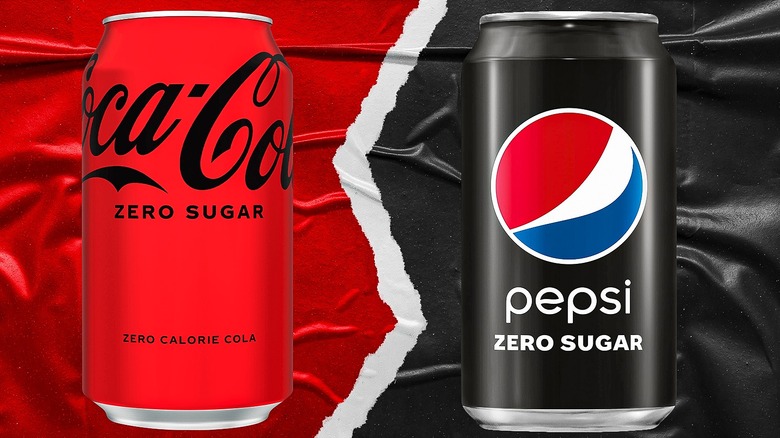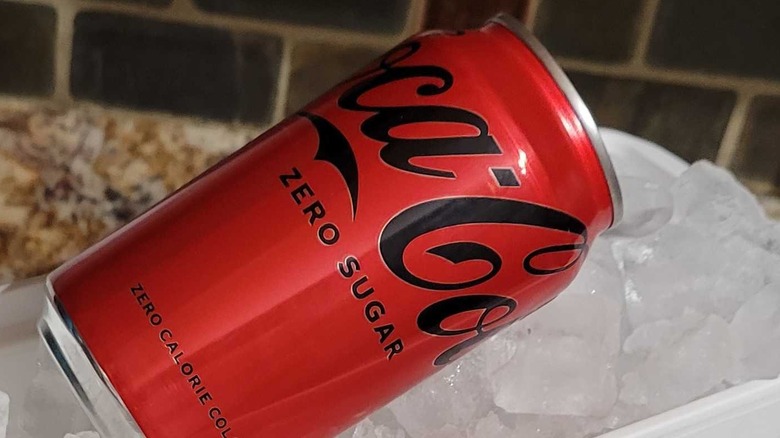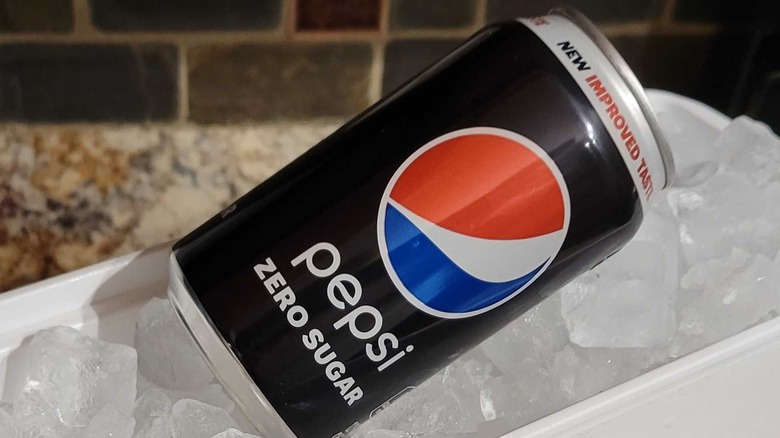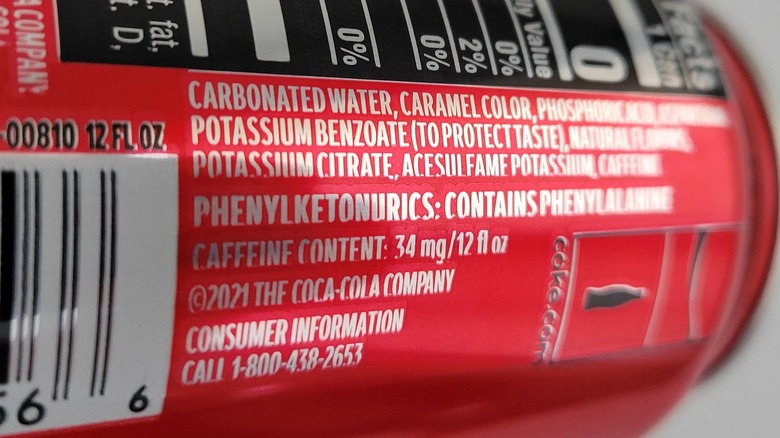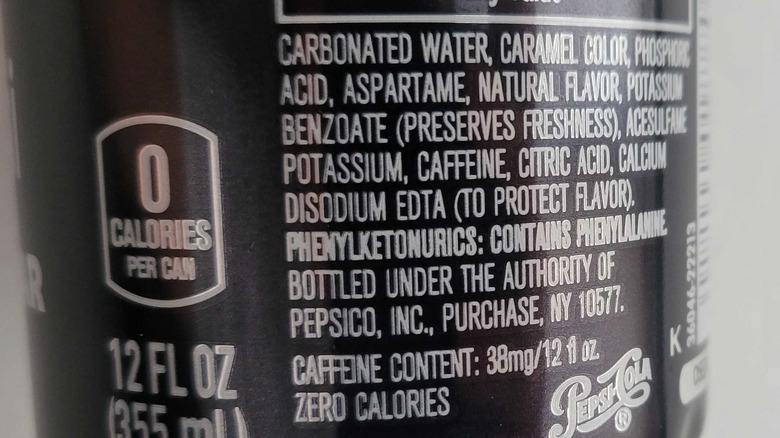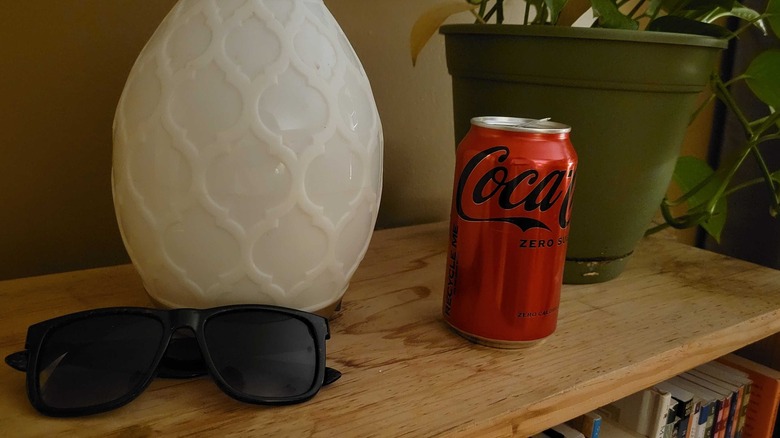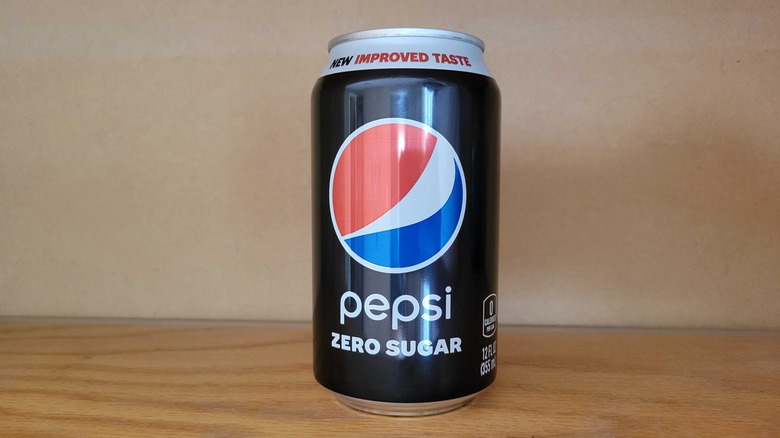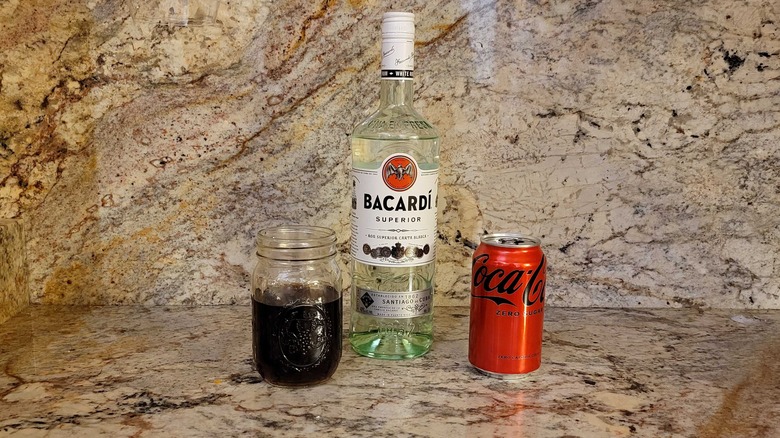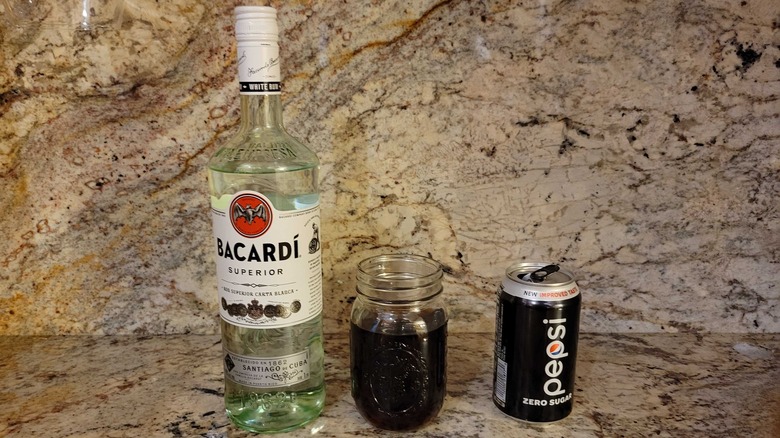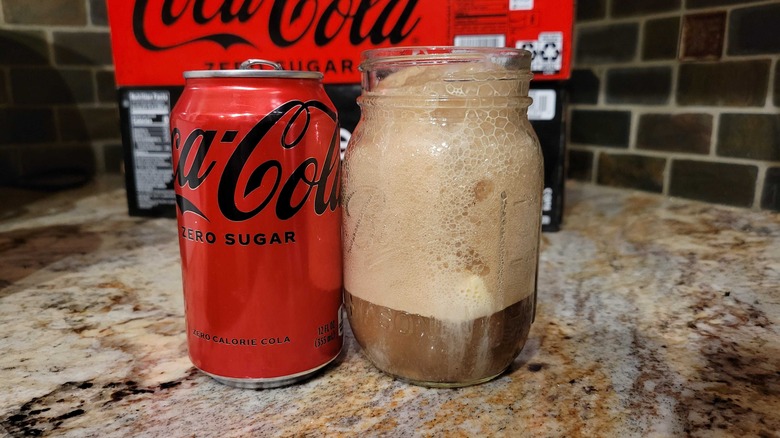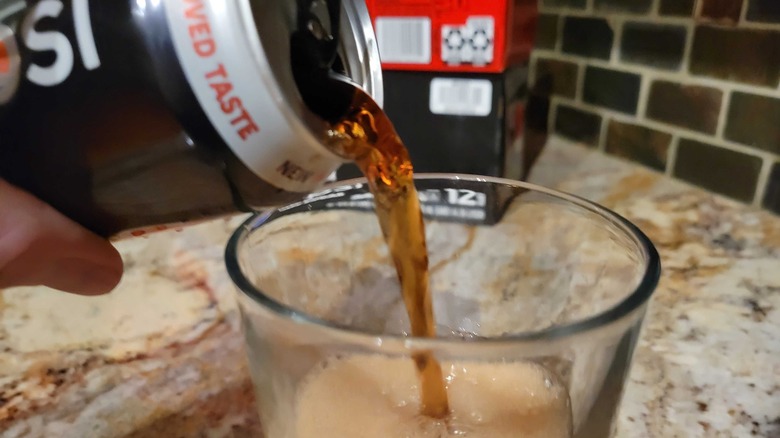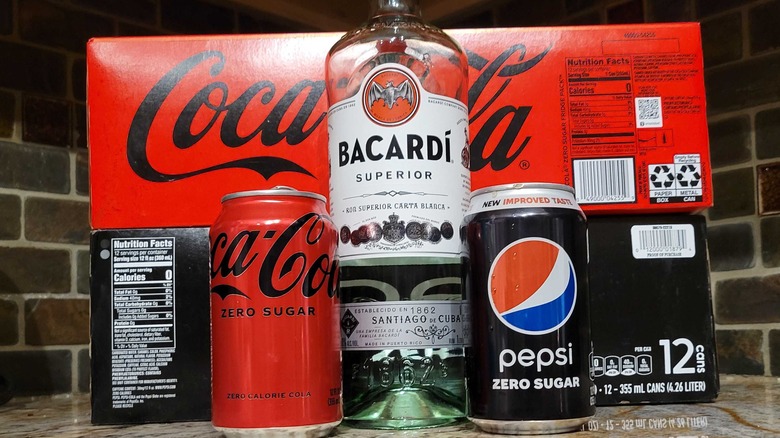Coke Zero Vs. Pepsi Zero: We Resolve The Modern-Day Cola Wars
The "cola wars" began way back in the 1970s, and Pepsi started it. After noticing Coca-Cola's sales were far outpacing its own, the soft drink company launched its famous "Pepsi Challenge" advertising campaign where members of the public seemed to prefer Pepsi over Coke in a blind taste test. However, some wars never end — they only escalate. While Pepsi gained ground in the initial battle, Coke retaliated in the 1980s by launching a calorie-free "diet" version of its regular drink. Diet Coke outsold regular Pepsi, and the company reacted by diversifying and concentrating more on its snack ranges.
But there is an argument the cola wars never really ended. Pepsi also launched a diet variety, and following the turn of the century, both brands expanded their calorie-free ranges with "zero sugar" lines of their main soft drinks. As tastes and health concerns have turned a significant number of people away from full-sugar soft drinks, the battleground has shifted towards these no-calorie alternatives. As such, you can argue that the modern cola wars aren't Coke vs. Pepsi, but rather Coca-Cola Zero Sugar Vs. Pepsi Zero Sugar. In an attempt to resolve this never-ending conflict, we drank copious amounts of sugar-free Coke and Pepsi, mixed them with alcohol, and even ate them for dessert. What follows is an in-depth analysis of their history, flavor, and how they've performed in certain situations. So stick around while we decide who has won the modern-day Cola War.
Coca-Cola Zero Sugar has been around for a while
The original "Coke Zero" is close to 20 years old. It launched back in 2005 when the Coca-Cola Corporation wanted to offer its customers another calorie-free alternative to regular Coke. There is of course Diet Coke, which has been around twice as long as Coke Zero, but the company obviously saw a potential demographic that the silver canned classic wasn't hitting. The original version of the zero-calorie soft drink is no longer around, the recipe changed back in 2017 to what Coke believed was a closer approximation to the full-fat, sugar-packed version we all know and love.
Since then, Coke hasn't just stuck to the "original" version of new Coca-Cola Zero Sugar. Instead, several special editions and promotional flavors have been launched. So customers wanting to cut down on their calorie intake aren't going to miss out on something like a crossover campaign with a popular singer like Rosalía. It's not limited to the United States, either. You're likely to find it anywhere regular Coke is widely available. So all in all, it's a firmly established part of Coca-Cola's product range, part of a still growing market as people look to cut down sugar intake, and probably won't be going anywhere for a while.
Pepsi Zero is a direct response to what Coke did
Pepsi Zero Sugar launched a few years after Coke added its second sugar-free line, so it's fair to say they were simply copying their rivals. While the labels are pretty much the same now, the original Pepsi product was labeled as "Diet Pepsi Max" in the United States, and just "Pepsi Max" in some other parts of the world. While it's fair to say neither company's "Zero Sugar" lines have dominated the market, Pepsi's attempt has flopped more than Coke's. Coke Zero Sugar sales accounted for around 4% of its total output, while only 1% of Pepsi's sales involved Pepsi Zero Sugar.
Recently, Pepsi accepted its Zero Sugar recipe wasn't good enough and opted to go back to the drawing board. What followed was a "new and improved" version of Pepsi Zero Sugar that the company describes as being "both bolder and sweeter" than its previous effort. New and improved recipes are sometimes found lacking, as Coca-Cola found out when it tried launching "New Coke" in the 1980s. But the rethink may also be evidence that Pepsi's old recipe just wasn't working; they were losing the battle against their old rivals, and drastic action needed to be taken if the North Carolina-based junk food manufacturer wanted to get an edge.
Coke Zero Sugar ingredient breakdown
The main ingredient of Coke Zero Sugar, as you may expect, is water. This is followed by a food coloring listed as Caramel E150d. Phosphoric Acid is added, acting as a preservative and bringing with it a tart flavor. Then we get to the ingredients that replace the sugar in this particular soft drink. The sweeteners in Coca-Cola Zero Sugar are listed as aspartame, which is a staple in many diet soft drinks, and acesulfame K, which is similar to aspartame but more resilient to heat. "Natural flavorings" are also listed, but the only one specifically named is caffeine. Sodium citrate acts as an acidity regulator, and the drink "contains a source of phenylalanine."
The ingredient list is pretty standard for many soft drinks, with the artificial sweeteners tending to be popular choices for many zero-calorie beverages. A few of the ingredients have been associated with health issues. Phenylalanine is a risk to people suffering from a condition called phenylketonuria, and artificial sweeteners have been linked to various ailments including some types of cancer. The phenylalanine is likely found in the aspartame, essentially singling this out as the most problematic ingredient. Unfortunately, some of the alternatives would either change the drink's flavor profile significantly. One of the alternatives is sugar, which would mean the drink is no longer calorie-free.
Pepsi Zero Sugar ingredient breakdown
As with Coke's effort, the main ingredient of Pepsi Zero Sugar is water — though Pepsi has specified this water is carbonated. Pepsi's calorie-free drink also contains a caramel color, though they haven't specified exactly which one. Phosphoric acid also appears along with the artificial sweeteners aspartame and acesulfame potassium. The ever-vague "natural flavor" makes an appearance, as does caffeine. Due to the artificial sweeteners, Pepsi Zero Sugar does contain phenylalanine and poses similar health risks to Coke's zero-calorie drinks.
So far, it seems pretty similar to Coca-Cola Zero sugar, but there are some differences — on the label, at least. Apparently, Pepsi Zero Sugar also contains potassium sorbate, citric acid, and curiously, "panax ginseng root extract." Calcium disodium edta is also included, and Pepsi claims this is to "protect the flavor" of the drink. Although it contains the same artificial sweeteners as Coca-Cola Zero Sugar, those sweeteners aren't really noticeable. So it's likely one of these extra ingredients somehow masks the flavor and makes it more similar to regular sugar.
How close is Coke Zero to regular Coke?
Coca-Cola Zero Sugar doesn't taste much like regular Coke. The first thing you'll notice when you take a swig is the clear taste of artificial sweeteners. It isn't quite as prominent and downright bad as it is in the diet version, but Coke Zero is still closer to Diet Coke than it is to original, full-calorie Coke.
Is this a bad thing? Not necessarily. As mentioned, it's not as foul tasting as Diet Coke, so it's at least the best calorie-free option Coca-Cola currently offers. There's also practicality to consider. When you swap out a major ingredient, sugar in this case (or high fructose corn syrup in the U.S.), the flavor profile is likely to be impacted. You're essentially making a trade-off. You'll spare yourself around 150 calories per can, but in return, you have to put up with a slightly off taste in comparison to the original recipe. For many, this trade-off is worth it — hence why calorie-free soft drinks still exist after many decades on the market. If the question is, "how pleasant can you make these drinks?" then Coca-Cola has certainly made its zero sugar edition more pleasant than Diet Coke. But Coke isn't just competing with itself, so the real question is: has Pepsi done a better job?
How close is Pepsi Zero to regular Pepsi?
Pepsi Zero is shockingly close to regular Pepsi in many ways, but overall it somehow tastes better. Pepsi tends to have a slightly flat flavor following the initial burst of sweetness, while its zero sugar equivalent draws that sweet flavor out. From memory, the flat flavorless section of regular Pepsi may be down to the use of high fructose corn syrup in place of sugar. If this is the case, Pepsi purchased outside the United States may actually be a dead ringer for Pepsi Zero Sugar. In the background, there's the familiar Pepsi take on the cola flavor and this is the same in both drinks.
If you haven't had a can of Pepsi in a while, you could probably be convinced that Pepsi Zero Sugar is in fact normal Pepsi. It wouldn't be shocking if someone ordered a Pepsi Zero at a fast food outlet and returned it believing they had gotten regular Pepsi by mistake. The absence of any strong aspartame flavor really disguises the fact it's a "diet" drink well, and unless you're a full-on Pepsi addict, you can only really notice major differences while trying the two side by side.
How is Coke Zero Sugar as a mixer?
Coke is a very common mixer for simple cocktails. Bartenders have been adding it to rum, whiskey, bourbon, and vodka for a long time. It's simple to make, and even simpler to drink. But how does its low-calorie equivalent fare when combined with a clear spirit? When we mixed it with Bacardi, Coke Zero Sugar had few of the benefits of its original equivalent. It also had some pretty glaring flaws that resulted in a notably unpleasant drinking experience.
Firstly, it didn't take the edge off the alcohol. A good mixer will mask the taste of a spirit's alcohol content almost completely. At the very least, you would expect it to be toned down and not as harsh on the palate. Unfortunately, Coke Zero Sugar seems to accentuate it. The unpleasant flavor of aspartame combines with the flavor of alcohol, making both significantly more noticeable. It's the opposite of what should be happening if you make a rum and coke. The soft drink's sweetness should go hand in hand with the rum's sweeter notes and make the drink altogether more pleasant.
A similar thing happened when Coca-Cola Zero Sugar formed the fizzy portion of a hard Coke float. The ice cream's sweetness did a lot of good work, but the worst elements of Coca-Cola Zoer Sugar's flavor profile were there waiting in the background. You really notice its shortcomings when they show up as part of the aftertaste and ruin what would otherwise be a nice cocktail.
Is Pepsi Zero as a mixer any better?
Pepsi Zero Sugar does a very good job as a mixer. It's on par with regular Pepsi and works well with a number of spirits including white rum, vodka, and whiskey. The additional sweetness the soft drink has pairs well with already sweet liquors like Bacardi. While it doesn't totally mask the taste of strong alcoholic beverages, it does take the edge off significantly. With plain liquors like vodka, the positive effect is less noticeable — but unlike Coke, it doesn't have any blatant downsides.
An experiment we conducted while slightly tipsy may also suggest Pepsi Zero Sugar is a great cocktail ingredient on top of everything else. We tipped some Bacardi White Rum into the Coke floats we were testing, and the result when the Pepsi Zero Sugar is involved is a very palatable dessert cocktail. All in all, if you're looking to shave a few calories off a drinking session, Pepsi Zero Sugar could be the way to go.
Are the Zero Sugar alternatives good with ice cream?
Coke may have an unfair advantage here, as the dessert/drink combo known as the "Coke float" is named after the beverage's iconic full sugar brother. Still, we decided to test out a couple of Coke floats using Pepsi Zero Sugar and Coke Zero Sugar to see which one is your best option if you want to shave a few calories off your dessert course. For the purposes of this test, we used a scoop of cheap, regular, vanilla ice cream. Nothing special.
Visually, Coke Zero is in front. It seems to eat into and redistribute the ice cream more than its rival, for reasons that are probably related to differences in carbonation and acidity but beyond us. We're food writers, not scientists. The ice cream retained its integrity more in the Pepsi Zero Sugar float, which isn't a good thing when you're basically aiming for an even blend of ice cream and soda.
In terms of taste, a generous scoop of ice cream does both drinks a lot of favors. The creamy, sweet, sugary taste of the vanilla ice cream is accented by the cola flavors of both soft drinks. However, the aspartame taste of Coke Zero Sugar again shows up amongst the Coke float's aftertaste, while the Pepsi Zero Sugar float doesn't have that. This was the closest test by far, and due to the aftertaste, Pepsi just edges this one.
Which is the better soft drink?
While we'd like to pretend this one was close, it isn't. Pepsi Zero Sugar wins this hands down. We're unsure exactly what wizardry Pepsi performed to take the aspartame's flavor out of its soft drink while leaving the sweetness, but the result was something almost indistinguishable from the original product. Coke Zero Sugar is more pleasant than Diet Coke, but it's still got that "calorie-free soft drink" flavor. You can tell it isn't coke, and if you don't like the flavor of aspartame, then it's going to be pretty unpleasant.
There is only one reason you would choose Coca-Cola Zero Sugar over Pepsi Zero Sugar, and that's if you're one of those people that just can't stand the taste of Pepsi. Otherwise, pick up a Pepsi Zero Sugar, as it's perfect on its own from the can, poured over a generous scoop of ice, or dousing a scoop of vanilla ice cream.
In terms of what constitutes a "healthy" choice, the jury is out in many ways. As previously mentioned, links between artificial sweeteners and diseases like cancer have been widely reported for a number of years, so that is something you'll have to consider. Both drinks use the same artificial sweeteners, so it may be fair to say the risk — if indeed any risk exists — is equal between them. Fizzy, acidic, things are also awful for your teeth, but again that's a soft drink problem and not a way to separate these drinks.
Which is the better mixer?
We decided to judge the drinks' performance as a mixer separately for pretty obvious reasons. The presence of alcohol can change things, so while one drink may be superior in most circumstances a tot of booze may make it inferior in others. However, a splash of Bacardi made the gulf in quality between Coca-Cola Zero Sugar and Pepsi Zero Sugar even more apparent.
Pepsi Zero Sugar, as you may expect, tasted just like a regular Bacardi and Pepsi. It didn't mask the flavor of the alcohol completely, but the white rum was complemented well by the additional sweetness of the Pepsi Zero Sugar and it was fairly pleasant on the whole. Coke Zero Sugar was a different story entirely. Again the aspartame flavor showed up and ruined the fun. As mentioned, the Bacardi somehow accentuated the flavor of the artificial sweetener, making a bad situation even worse. So, whatever your needs, Pepsi Zero Sugar is by far your best option if you're looking for a no-calorie alternative to your favorite soft drink.
